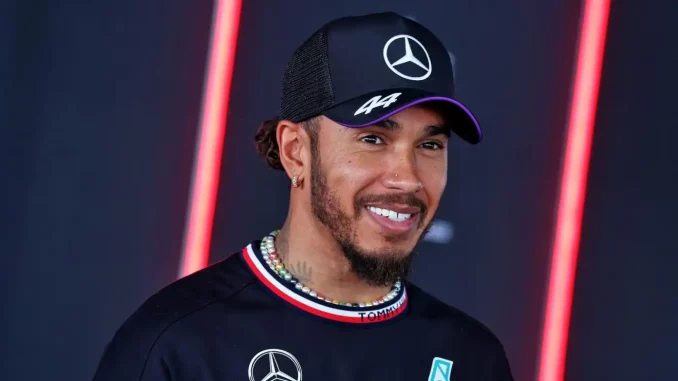
 In the world of high-octane motorsport, Lewis Hamilton is as much a powerhouse off the track as he is on it, known not only for his racing prowess but also for his advocacy and philanthropic pursuits. With Formula 1 recently securing a historic sponsorship deal with luxury conglomerate LVMH—an agreement projected to generate a staggering $1 billion for the sport over the next decade—the question of how this influx of funds might impact the sport, its fans, and the broader motorsport community has become a topic of significant interest.
In the world of high-octane motorsport, Lewis Hamilton is as much a powerhouse off the track as he is on it, known not only for his racing prowess but also for his advocacy and philanthropic pursuits. With Formula 1 recently securing a historic sponsorship deal with luxury conglomerate LVMH—an agreement projected to generate a staggering $1 billion for the sport over the next decade—the question of how this influx of funds might impact the sport, its fans, and the broader motorsport community has become a topic of significant interest.
LVMH, a titan in the luxury industry, oversees an impressive portfolio of high-end brands including Louis Vuitton, Moët Hennessy, and TAG Heuer. Their alliance with F1 is one of the most lucrative partnerships in the sport’s history, promising to bring a new level of opulence to the paddock, while simultaneously positioning F1 as a key player in the luxury market. Yet, for Hamilton, a seven-time world champion with a long-standing reputation for speaking his mind on matters of social justice, environmental sustainability, and charity, this partnership has raised an additional question: *Could part of the funds be used for charitable and community-focused initiatives?*
Speaking to various media outlets, Hamilton expressed his hope that a portion of the proceeds from this landmark deal might be directed toward positive change within the F1 community and beyond. “All I hope is that, there probably isn’t, but I hope that there’s an impact element to that deal,” Hamilton stated. “Because it’s two huge organizations making a crazy amount of money in a year. It shouldn’t be about how much more money we can make; it should be about what impact we can make with this partnership.”
For Hamilton, the sponsorship represents an opportunity to turn profit into purpose, leveraging LVMH’s extensive resources to contribute to F1 in ways that extend beyond financial gain. He went on to emphasize that while F1 has always been a lucrative sport, true impact comes from initiatives that support underrepresented groups, promote diversity, and give back to communities involved in the motorsport industry.
Hamilton’s Vision for a More Inclusive F1
Hamilton has long been a trailblazer for change in the world of motorsport. His *Mission 44* foundation, established in 2021, aims to empower young people from underrepresented backgrounds, supporting programs that address issues of systemic inequity and promote diversity within motorsport. This new LVMH deal, according to Hamilton, presents a unique chance to further these goals on a grander scale.
In his statement, Hamilton hinted at his intention to raise the matter with F1 President Stefano Domenicali, advocating for some of the funds to be allocated toward projects that support diversity, sustainability, and social impact. Hamilton has previously been vocal about his commitment to a more inclusive F1, challenging the sport to reflect the diversity of its global fanbase both on and off the track.
While Hamilton himself enjoys a successful partnership with Mercedes and shares a close relationship with other major brands, he has consistently used his platform to address social issues. Hamilton’s call for “impact” from the LVMH deal resonates with the values he has championed throughout his career.
The LVMH Deal: A New Era of Luxury in Formula 1
The $1 billion LVMH partnership marks a turning point for F1, bringing in a series of luxury brands that will elevate the profile of the sport to unprecedented levels. LVMH’s involvement will likely see high-end fashion, exclusive events, and a more opulent aesthetic associated with the F1 brand. Brands like Louis Vuitton, Moët Hennessy, and TAG Heuer have already begun exploring how to blend luxury with F1’s high-speed appeal, potentially attracting a new demographic to the sport.
But for Hamilton, the value of this partnership goes beyond mere financial profit or even the allure of luxury brands. While the glamour of LVMH brands aligns with F1’s global appeal, he hopes to see some of this wealth redirected to programs that could bring about substantial change in motorsport. His perspective is a reminder that while sponsorships bring capital, their impact can be significantly multiplied when part of those funds are directed towards positive societal outcomes.
The Luxury and Motorsport Connection
Formula 1’s partnership with LVMH is not entirely surprising. Both F1 and luxury brands share a certain ethos: exclusivity, high performance, and a global reach that appeals to audiences in major cities around the world. This collaboration signals an alignment of values, with both sectors seeking to appeal to aspirational markets while delivering high-stakes entertainment. Luxury brands have long held a fascination with motorsport, capitalizing on F1’s thrill and sophistication to attract high-net-worth individuals.
Yet, as Hamilton suggests, this partnership offers F1 a chance to transcend the conventional sponsorship model. By investing in community-focused projects, the LVMH deal could become a model for other high-profile sponsorships, proving that success in sports sponsorship can include a commitment to corporate social responsibility.
Hamilton’s concerns come at a time when F1 is increasingly under pressure to demonstrate its commitment to inclusivity, sustainability, and ethical practices. As one of the sport’s most influential figures, Hamilton’s advocacy holds weight, and his willingness to speak openly about the need for social responsibility within F1 is inspiring a new generation of fans and stakeholders to demand more from the sport.
Looking Ahead: Will F1 Answer the Call for Change?
While Hamilton is hopeful, he remains skeptical, acknowledging that he’s “not holding his breath” for a charitable allocation within the LVMH deal. However, his decision to address the topic publicly has already sparked discussions among fans and commentators, with many echoing his call for F1 to leverage its financial success for the greater good.
Whether or not his vision comes to fruition, Hamilton’s remarks underscore a growing trend within sports sponsorship, where athletes and fans alike are calling for deals that prioritize social impact alongside financial return. If Formula 1 and LVMH were to heed Hamilton’s call, the partnership could set a new standard in global sports sponsorship, proving that luxury and philanthropy are not mutually exclusive.
Hamilton’s Legacy: A Champion on and off the Track
As Hamilton continues to challenge the status quo, he solidifies his legacy as more than just a racing champion. Through his calls for accountability and action, Hamilton is leveraging his influence to foster a sport that prioritizes inclusion, sustainability, and community involvement.
The seven-time world champion has already cemented his status as one of F1’s all-time greats, but it is his activism that has set him apart as a true leader in the sport. By advocating for a more equitable F1, Hamilton is ensuring that his legacy will extend far beyond the racetrack, inspiring future generations to champion causes that reflect the values of compassion, fairness, and positive impact.
In the months and years ahead, the motorsport community will be watching closely to see if F1 and LVMH will rise to the challenge posed by one of its most iconic drivers.
Leave a Reply